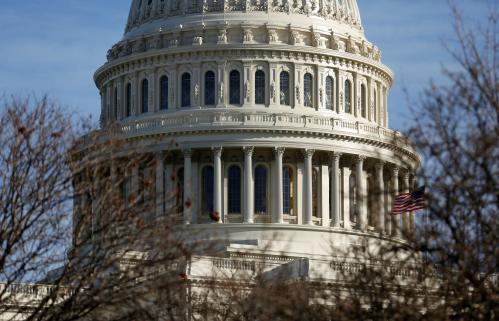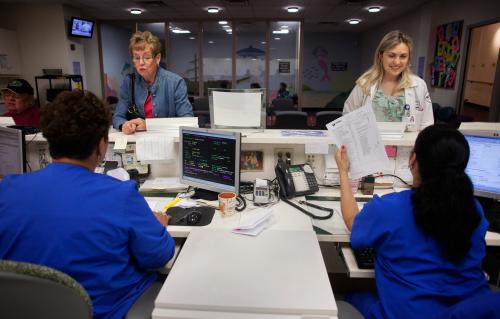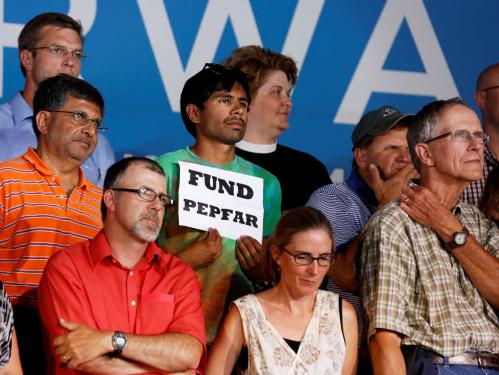This analysis is part of The Leonard D. Schaeffer Initiative for Innovation in Health Policy, which is a partnership between the Center for Health Policy at Brookings and the USC Schaeffer Center for Health Policy & Economics. The Initiative aims to inform the national health care debate with rigorous, evidence-based analysis leading to practical recommendations using the collaborative strengths of USC and Brookings.
Each year, millions of Americans seek care at a facility in their insurer’s network or with an in-network physician only to be hit with a surprise bill from an out-of-network provider involved in their care who they did not actively choose. These bills can be very large because out-of-network providers can “balance bill” the patient—meaning that the provider bills a patient for the difference between what the patient’s health insurance will pay and the provider’s “list price” (which can be very large and bears little relation to the rates they usually accept or their costs).
Surprise balance billing, then, arises when patients lack reasonable opportunity to receive care from in-network providers with contractually negotiated rates and are subsequently balance billed by an out-of-network provider. The frequency of surprise billing is substantial and the financial consequences can be devastating.
Need for Department of Labor action
A number of states have acted to prohibit or limit surprise billing for patients covered by regulated insurers, but approximately half of the privately-insured market is covered by self-funded employer-sponsored plans, which cannot be regulated by states, due to pre-emption of state law by a federal law known as ERISA (the Employee Retirement Income Security Act). Data indicate that the surprise billing problem is just as prevalent under employer plans as elsewhere in the market.
The Schaeffer Initiative for Innovation at Health Policy, a partnership between the Center for Health Policy at Brookings and the USC Schaeffer Center for Health Policy & Economics, recently published a paper that examines the extent of surprise medical bills and how they can be eliminated.
While a comprehensive federal solution, like that outlined in the Schaeffer Initiative paper, would be the ideal method to address surprise balance billing, the Department of Labor (DoL) can take concrete steps to begin mitigating the problem.
How the Department of Labor can help
1. Clarify that states have authority to regulate provider payment
Under Supreme Court precedent, it should be clear that despite ERISA pre-emption, states are free to regulate health care providers as they wish, even when providers are paid by employer-sponsored plans.[1] The main thing states can’t do, for self-funded plans, is regulate the plans themselves. This should leave states free to establish maximum and minimum billing rates for providers in surprise billing situations and to establish dispute resolution mechanisms between patients and providers, as New York State has done, for instance.
Although this authority may appear clear to some legal analysts, few aspects of ERISA pre-emption are truly clear to many people. Therefore, without explicit regulatory guidance, states may be deterred from considering their full range of regulatory options. Or, stakeholders who oppose action might increase uncertainty about the legality of proposed measures, perhaps by threatening litigation.
Accordingly, DoL should issue a formal ruling or guidance that clarifies its interpretation of the extent of state authority to regulate out-of-network billing by providers who treat patients covered by employer-sponsored plans, including those that are self-funded.
2. Extend network adequacy standards to address surprise billing
The DoL currently imposes network adequacy standards on employer-sponsored plans in order to determine when it is and is not appropriate to disregard patients’ out-of-network expenses in calculating the out-of-pocket maximum set by the Affordable Care Act. DoL could extend this existing authority to surprise billing by ruling that bills from out-of-network providers do count toward (or may not be disregarded in) meeting the law’s out-of-pocket maximum.
This position currently is taken by the Centers for Medicare and Medicaid Services (CMS) with respect to the out-of-pocket maximum in “Qualified Health Plans” offered through federally-facilities exchanges. Therefore, it makes sense to extend that interpretation to the same out-of-pocket provision that applies to employer-sponsored plans.
3. Require employer-sponsored plans to notify patients of out-of-network care
Surprise billing sometimes arises simply because patients lack reasonable and timely notice that some of their providers might be out of network. A number of state legislative efforts thus seek to reduce the incidence of surprise billing by requiring that patients receive better notice. DoL could impose similar notice requirements on employer-sponsored health plans.
To be effective, such notice should be specific to a patient’s anticipated course of treatment (and not generically on an annual basis, for instance). The notice should provide some indication of the particular financial consequences for that patient of receiving out-of-network care and indicate what steps that patient reasonably might take to arrange for in-network care.
4. Require employer-sponsored plans to comply with a dispute resolution process
Using its authority over dispute resolution between plan members and plan sponsors, DoL could require that employer-sponsored plans comply with the dispute resolution processes that states might create to resolve surprise billing situations.
5. Create a safe harbor that incentivizes employers to meet their fiduciary duty to protect plan members from unfair bills
Arguably, an employer (plan sponsor) has a fiduciary duty to avoid having members receive unfair or surprise out-of-network bills. Rather than resolving the precise extent of such a duty, the DoL could specify a safe harbor that, if plans sponsors meet, clearly absolves them from any claim of breach of fiduciary duty in this regard—leaving the decision to comply with the safe harbor up to plan sponsors.
Such a safe harbor could specify, for instance, that in unfair surprise situations such as those listed in the table at the beginning, a patient’s cost-sharing will be no more than if they had remained in network, and that the plan will pay the out-of-network provider at “usual, customary, and responsible” rates determined by a recognized benchmark, such as the 75th percentile of the FAIR Health database. Alternatively, a reasonable out-of-network payment rate could be benchmarked to Medicare’s payment rate for the same service.
The author did not receive financial support from any firm or person for this article or from any firm or person with a financial or political interest in this article. He is currently not an officer, director, or board member of any organization with an interest in this article.
[1] De Buono v. NYSA-ILA Medical and Clinical Services Fund 520 U.S. 806 (1997); and New York State Conference of Blue Cross & Blue Shield Plans v. Travelers Ins. Co., 514 U. S. 645 (1995).







Commentary
How the Department of Labor can help end surprise medical bills
December 14, 2016